How Ambulatory Detox Promotes Autonomy in Recovery

Understanding Ambulatory Detox
Ambulatory detoxification is redefining the landscape of addiction recovery by emphasizing personal autonomy and independence. Unlike traditional inpatient programs, ambulatory detox allows individuals to undergo the detox process in an outpatient setting, enabling them to manage daily responsibilities while receiving necessary medical support. This approach is uniquely positioned to support people in their journey towards recovery by fostering autonomy, minimizing disruption, and empowering patients to actively participate in their treatment. In this article, we explore the various dimensions of ambulatory detox, its benefits and processes, and how it stands out as an effective tool in promoting personal agency and sustained recovery.
Fostering Independence Through Ambulatory Detox
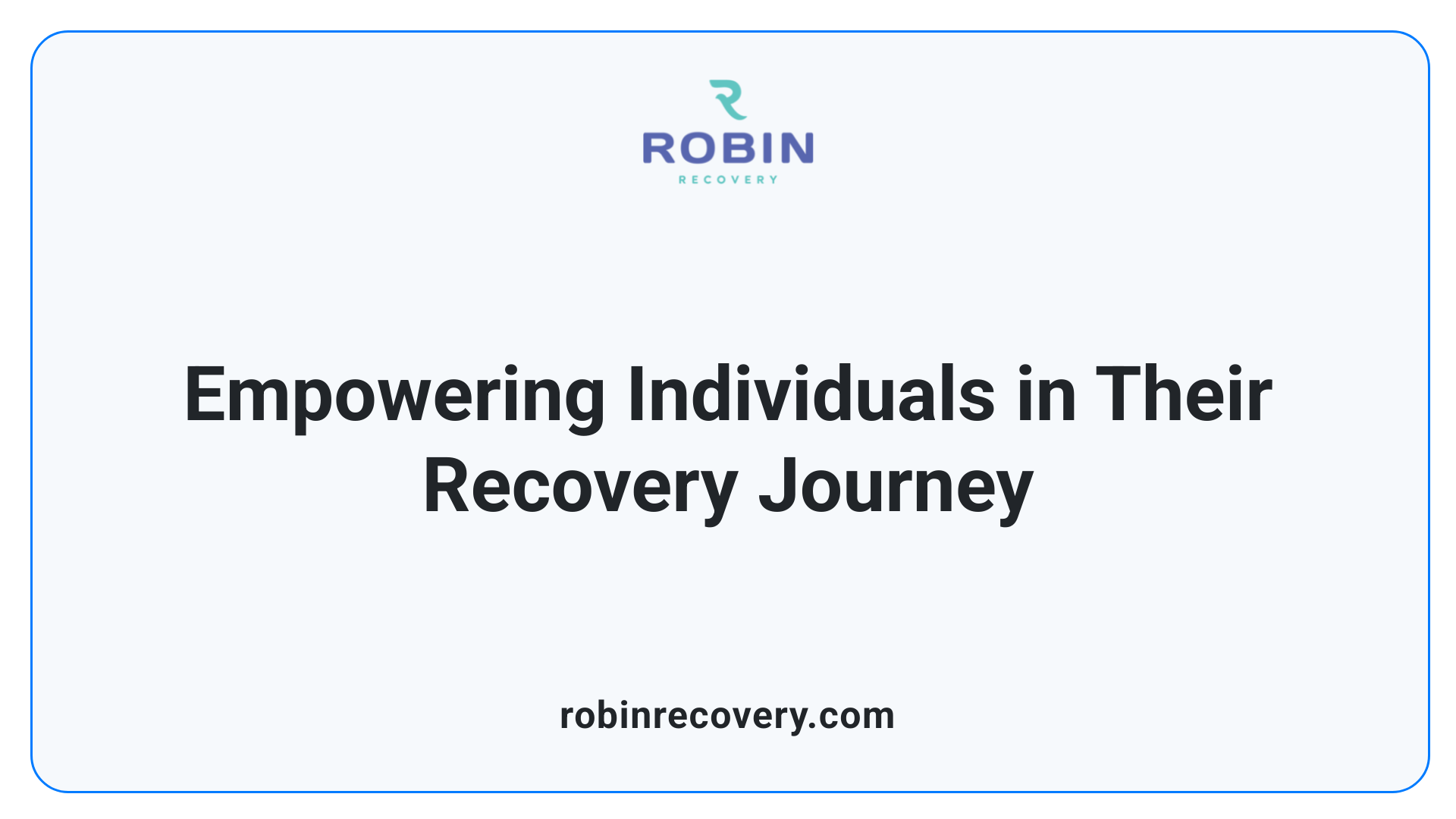
What is the role of ambulatory detox in enhancing personal autonomy and independence during addiction recovery?
Ambulatory detox plays a crucial role in enhancing personal autonomy and independence during addiction recovery. This outpatient approach allows individuals to undergo detoxification while managing their daily responsibilities. By not requiring an overnight stay in a medical facility, patients can continue their work or family life, fostering a sense of normalcy during a challenging time.
This method effectively serves as a bridge to subsequent addiction treatment, as studies link successful transitions from detox to better recovery outcomes. These outcomes include reduced relapse rates and greater stability in housing and employment, directly reflecting the benefits of maintaining autonomy during recovery.
Patients are actively involved in their treatment decisions, which builds accountability and personal choice. The setup fosters an environment where individuals can comfortably engage in self-care practices and seek support when necessary. For example, many programs offer flexible scheduling for therapy sessions, allowing individuals to integrate their recovery journey into daily routines more seamlessly.
Moreover, the emphasis on creating personalized treatment plans and incorporating family support reinforces the autonomy of patients. As they navigate their recovery, they learn crucial skills for self-management, making them more resilient and capable of living independently post-treatment.
Ambulatory Versus Inpatient Detoxification: A Comparative Analysis
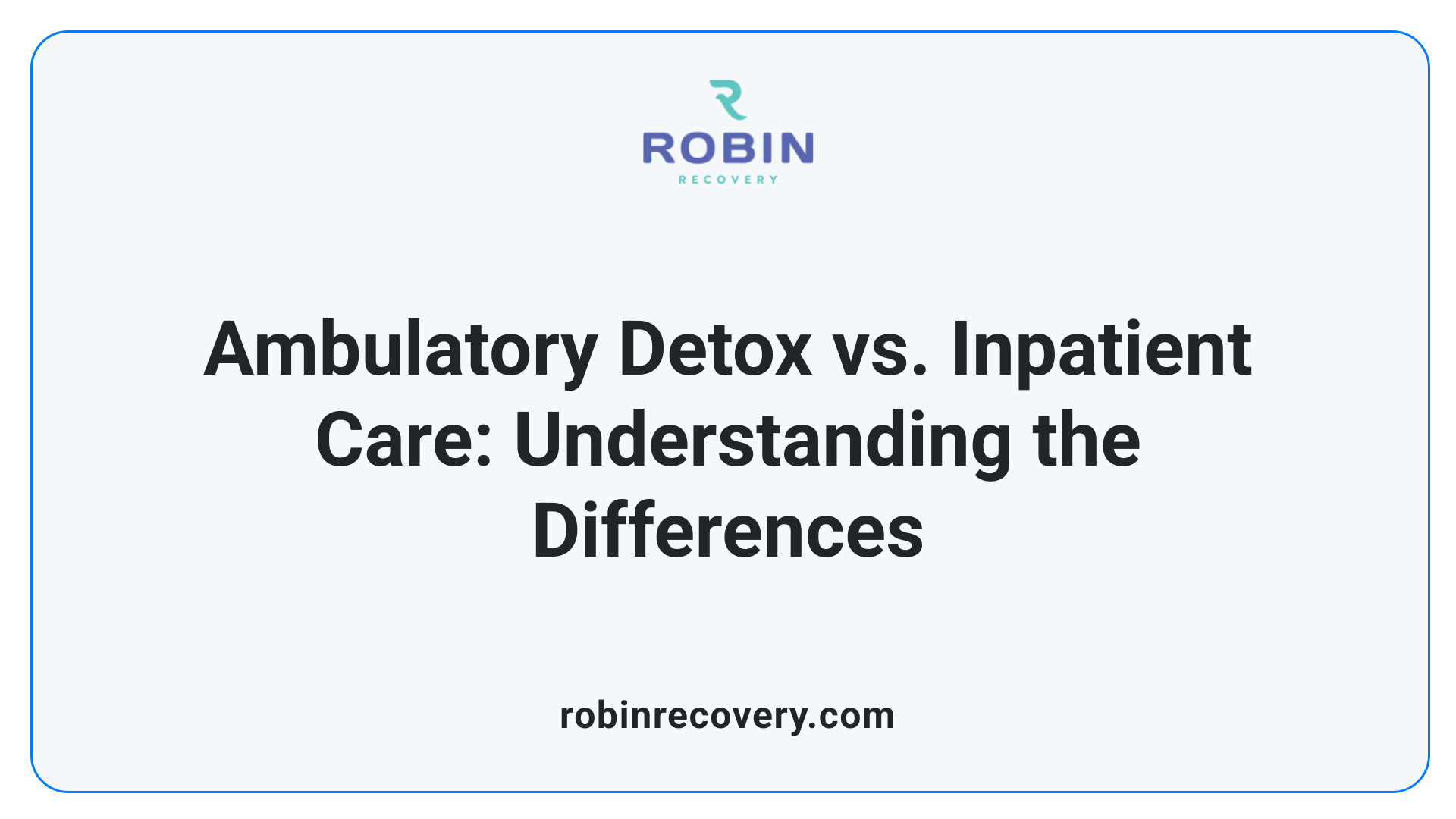
How does ambulatory detox compare to traditional inpatient care?
Ambulatory detox and traditional inpatient care present distinct frameworks for managing substance withdrawal. The ambulatory approach empowers individuals to undertake detoxification in a familiar environment, promoting autonomy and the maintenance of daily life routines. It is highly flexible, allowing patients to engage with their personal and professional responsibilities, which may enhance their recovery experience at a lower cost compared to inpatient services.
In contrast, inpatient detox is often necessary for individuals confronting severe addiction challenges or complex health conditions. This model offers a structured, controlled setting with continuous medical supervision. Such an environment can be critical for those at risk of severe withdrawal symptoms, where immediate access to medical support may be required.
Impact on recovery
The efficacy of each method heavily relies on the individual's unique needs. Studies suggest that ambulatory detox is most effective for those with mild to moderate withdrawal symptoms and a solid support system at home. Patients often report lower stress levels and fewer cravings, thanks to personalized treatment plans and ongoing support.
Importantly, both methods aim to foster a patient's commitment to change and readiness for follow-up treatment. While ambulatory detox promotes self-direction and involvement in recovery, inpatient programs provide heightened safety and oversight. Ultimately, finding the right fit depends on individual circumstances, reinforcing the importance of personalized treatment strategies in achieving lasting recovery.
Feature Ambulatory Detox Inpatient Detox Environment Home or community settings Medical facility Supervision Scheduled visits with medical professionals Continuous monitoring by healthcare staff Flexibility High – maintains daily routines Low – structured schedule Cost Generally lower Higher – comprehensive care comes at a premium Best for Mild to moderate withdrawal, stable support systems Severe addiction or medical complexities
Identifying Ideal Candidates for Ambulatory Detox
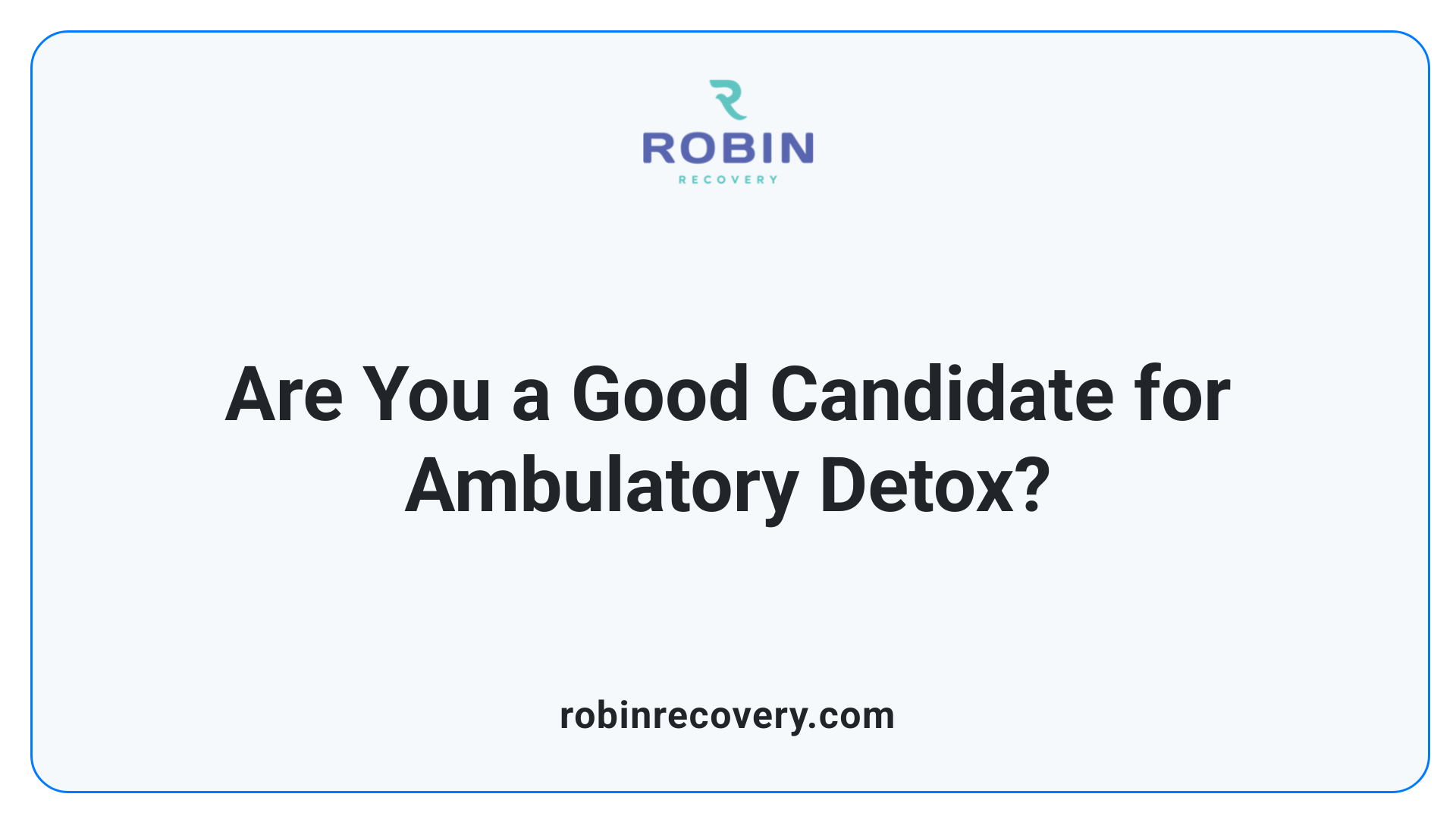
Who are the ideal candidates for ambulatory detox programs?
Ideal candidates for ambulatory detox programs include individuals who exhibit certain characteristics that support effective recovery. These candidates often display the following traits:
- Stable Living Environment: Candidates should have a supportive home setup where they can safely manage their detoxification.
- Moderate to Mild Withdrawal Symptoms: Those experiencing mild to moderate withdrawal are typically better suited for outpatient care.
- Supportive Network: Having family or friends who can provide emotional support is critical to fostering an effective recovery.
- Medical Stability: Candidates must be medically stable and have no history of complicated withdrawal or detoxifications.
- Motivation and Willingness: A strong desire to change and the ability to adhere to treatment plans contribute significantly to successful outcomes.
- Flexibility in Schedule: Busy professionals or parents who have responsibilities that they can't neglect find that ambulatory detox offers the perfect balance, allowing them to fit recovery into their lives without significant disruption.
Candidates who can integrate new skills learned during treatment within a supportive home environment benefit greatly from ambulatory detox programs. These individuals are empowered to take control of their recovery journey while still managing personal and professional commitments, strengthening their autonomy in the process.
The Advantages of Outpatient Detoxification
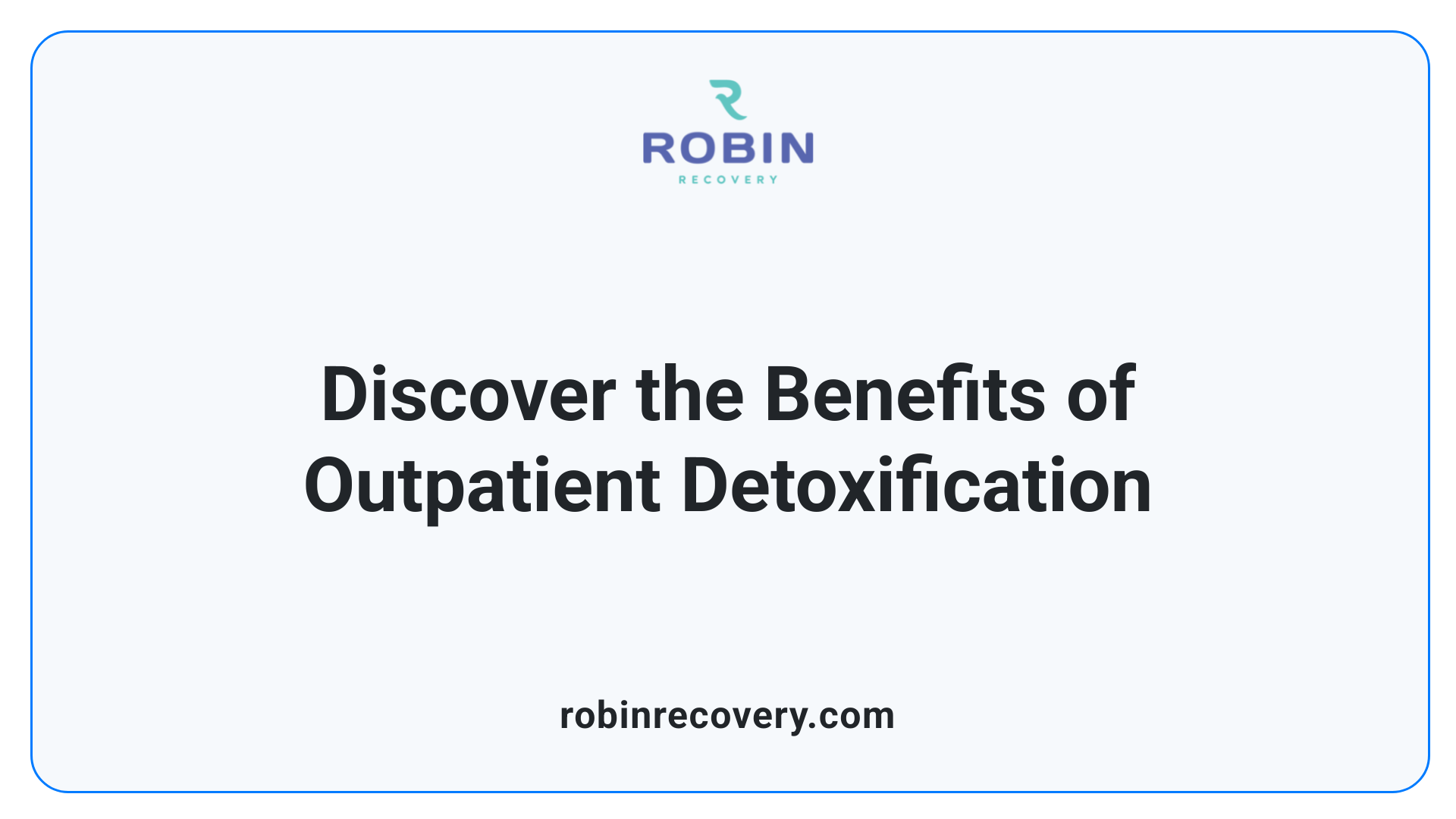
What are the key advantages of outpatient detoxification methods?
Outpatient detoxification methods present several advantages that greatly support individuals in their recovery journey. First and foremost, they are often more cost-effective when compared to inpatient services, enabling individuals to invest more resources into ongoing support beyond detoxification.
This approach allows individuals to maintain their daily responsibilities, such as work and family commitments, which is crucial for emotional stability. By staying in their familiar environment, patients experience less disruption to their routines, leading to improved mental well-being during the detox process.
Outpatient detox is particularly effective for those with mild to moderate withdrawal symptoms, as it provides essential medical oversight without requiring an overnight stay in a facility. Patients typically participate in shorter daily sessions that fit seamlessly into their schedules, making treatment more accessible.
Moreover, the ability to receive remote counseling and support means that individuals can develop coping strategies while remaining connected to their social networks. This continued emotional support is critical in building motivation and fostering accountability throughout the recovery process.
Additionally, the integration of family involvement enhances the patient’s support system, contributing to a greater likelihood of long-term success by creating a robust network of encouragement and understanding. Ongoing therapeutic interventions and structured follow-up help reinforce the principles of recovery, paving the way for sustainable progress into long-term rehabilitation.
Coping Strategies and Recovery Outcomes
How do detox processes and coping strategies impact recovery outcomes?
Detox processes and coping strategies are pivotal in shaping the trajectory of recovery from substance use disorders. Ambulatory detoxification, with its focus on individualized treatment plans, provides a tailored approach to manage withdrawal symptoms safely while allowing patients to remain in their familiar environments at home. This model not only fosters autonomy but also encourages individuals to maintain their daily routines, which can enhance their sense of normalcy and stability during a challenging time.
A well-structured detoxification process facilitates a smoother transition into ongoing treatment. Patients often experience fewer cravings and withdrawal symptoms as the ambulatory model allows for customized medication titration, addressing symptoms effectively and minimizing discomfort. This supportive atmosphere encourages self-directed efforts in recovery while enhancing personal accountability and commitment.
Coping strategies, such as mindfulness meditation, journaling, and gratitude practices, play a crucial role in reinforcing a patient's mental wellness. These strategies help individuals manage stress and emotional hurdles, ultimately fostering resilience and encouraging autonomy in their recovery journey. They empower patients by improving self-awareness and equipping them with tools to navigate challenges encountered in recovery.
By integrating effective detoxification processes with supportive coping strategies, individuals can build a robust foundation for sustained recovery, significantly reducing the likelihood of relapse and promoting better long-term management of substance use.
Effectiveness of Ambulatory Detox in Promoting Autonomy
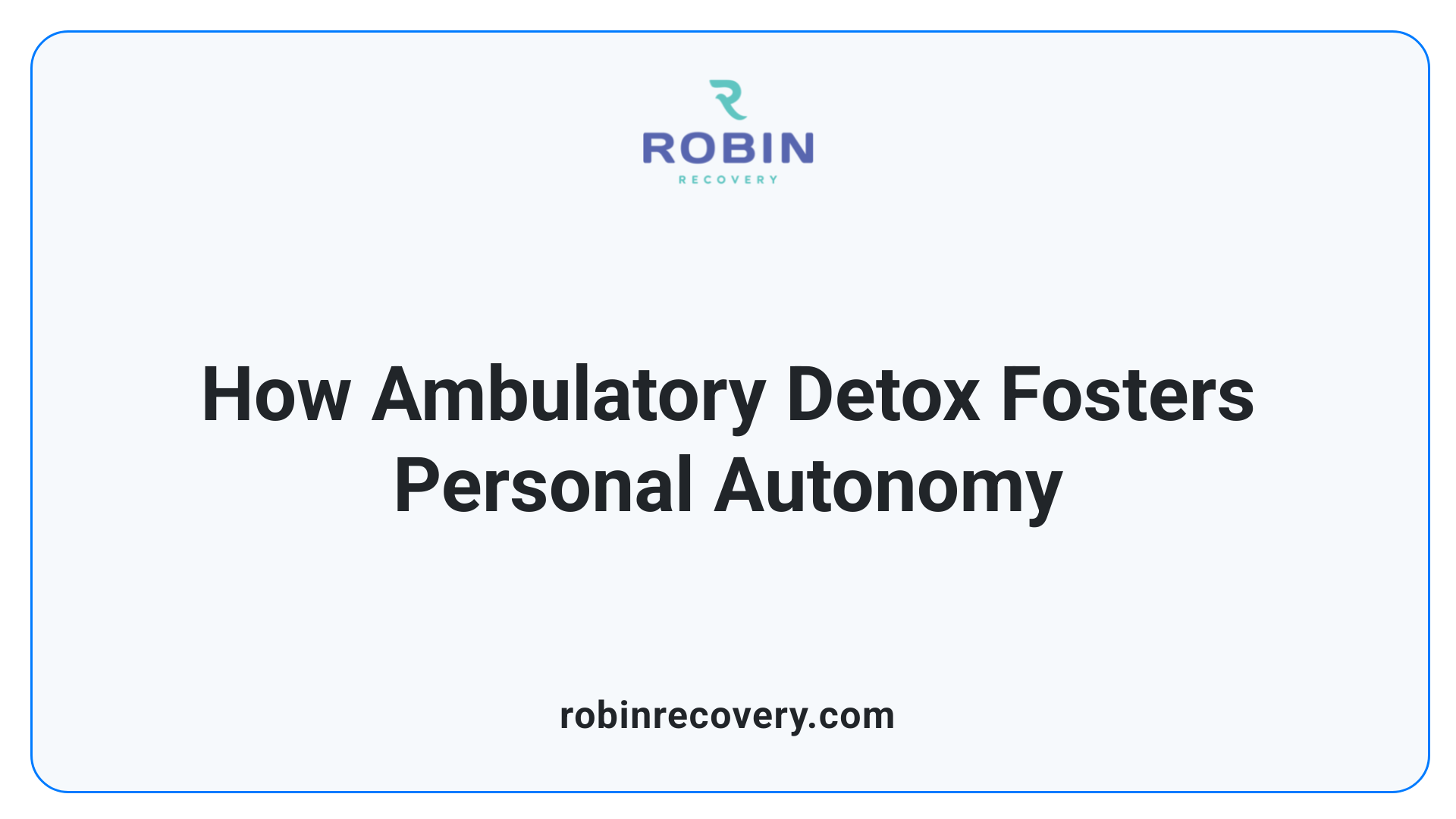
What is the effectiveness of ambulatory detox in promoting autonomy in recovery?
Research indicates that ambulatory detox can effectively promote autonomy in recovery by allowing individuals to undergo the detox process at home. This method fosters a sense of normalcy and independence during a pivotal time in their recovery journey. By enabling individuals to actively manage their detox process, ambulatory detox helps maintain daily routines, minimizing disruptive impacts on their lives.
Professional guidance and remote counseling throughout the outpatient detoxification process further enhance this sense of autonomy. These supports encourage individuals to engage actively in their recovery efforts, bolstering their motivation and commitment. Studies show that success rates for detoxification are comparable in both inpatient and outpatient settings, especially when there is robust long-term support.
The integration of personalized treatment plans—tailored to meet each patient's individual needs—also strengthens their sense of control over their recovery. This patient-centered approach not only empowers individuals but also fosters a smoother transition into ongoing treatment, ultimately leading to improved long-term recovery outcomes.
Influence on personal agency
The elements of autonomy and personal agency are critical in fostering a successful recovery. Ambulatory detox allows patients to partake in their recovery with a self-directed mindset, as they feel empowered to make choices about their treatment. This proactive approach has been demonstrated to improve self-respect and accountability, further promoting independence. As individuals engage in practices like journaling and mindfulness, they hone their understanding of personal triggers and coping strategies, which contribute to stronger personal agency during and after detox.
Integrating Ambulatory Detox into the Recovery Journey
Role in broader rehabilitation process
Ambulatory detoxification plays a significant part in an individual's overall rehabilitation journey. By allowing patients to manage their withdrawal symptoms in a familiar environment, it fosters autonomy and comfort, essential for recovery. This method empowers individuals to craft their own paths toward sobriety while maintaining ties to their daily responsibilities.
Moreover, the personalized treatment plans offered by facilities like River's Bend enhance self-worth and ensure that interventions are tailored to each person's unique needs. The collaborative relationships developed between patients and healthcare providers create a supportive framework that encourages self-determination.
Facilitating transitions in recovery
Successful transition from detoxification to continued treatment is vital for long-term recovery. Ambulatory detox supports this by providing ongoing medical supervision and scheduled evaluations, reinforcing the patients' ability to communicate their needs. Furthermore, the integration of family support into the outpatient model enriches recovery by allowing individuals to have a strong network post-treatment.
Research suggests that patients who positively transition into follow-up addiction treatment show reduced relapse rates and improved life stability. This reinforces the importance of ongoing care coordination, education, and accountability within their recovery plans. Ultimately, ambulatory detox lays the groundwork for sustainable recovery, emphasizing both personal initiative and community support.
Aspect of Ambulatory Detox Details Benefits Personalization Tailored treatment plans Enhances self-worth and engagement Flexibility Scheduling that accommodates work/life Reduces stress and enhances recovery environment Family Involvement Support system engagement Fosters accountability and connection Transition Support Ongoing evaluations and education Reduces relapse and promotes stability
Charting the Path Forward with Autonomy
As we reflect on the role of ambulatory detox in fostering autonomy during addiction recovery, it becomes apparent that its value lies in its ability to integrate treatment into everyday life. By empowering individuals to take charge of their recovery in their familiar environments, ambulatory detox not only simplifies the detox process but also paves the way for effective long-term treatment. This ideal blend of personal agency, professional support, and practical flexibility creates a robust platform for sustainable recovery, allowing individuals to reclaim their lives with renewed confidence and self-determination. As the field of addiction treatment continues to evolve, embracing autonomy as a core principle will be key to helping more people achieve successful and lasting recovery.
References
- The Transformative Power of Ambulatory Detoxification
- Ambulatory Detox Modality Delivers Better Results - Psychology Today
- Respecting Your Autonomy in Substance Abuse Treatment -
- 2 Settings, Levels of Care, and Patient Placement - NCBI
- Understanding Ambulatory Detoxification: Is It Right for You?
- Finding Personal Autonomy in Recovery
- Outpatient Detox Model Gaining Popularity in Treatment
- Ambulatory Detoxification of Patients with Alcohol Dependence - AAFP
